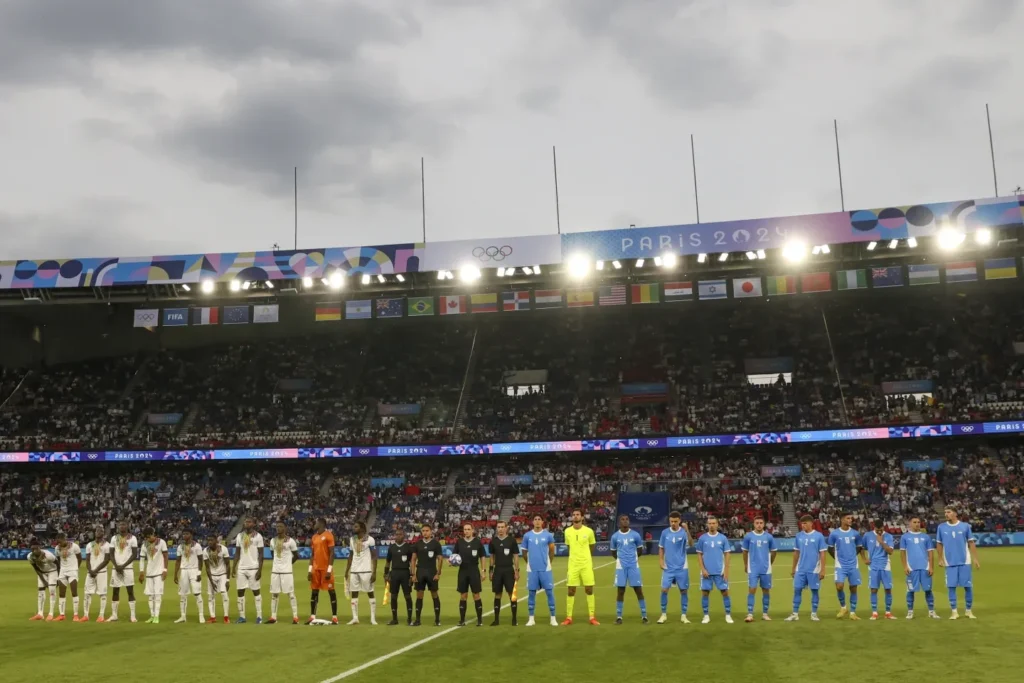Prelude to the Match: A High-Profile Security Operation
The stage was set for an intense soccer clash at the Paris Olympics on a Wednesday evening, as Israel’s national team faced off against Mali. But beyond the anticipation for the game, the scene outside the Parc des Princes stadium was marked by a palpable tension that extended well beyond the soccer field.
A Heavily Guarded Event
The security operation for this particular match was extensive. Israel’s arrival at the stadium was orchestrated with a high level of caution. The team was escorted by a substantial police convoy, including motorbike riders leading the way and a dozen riot police vans following closely behind. The heightened security was a reflection of the increasing international strain and the broader security climate affecting Paris.
Inside the stadium, security personnel were visibly present, with armed officers patrolling the venue. One officer, in particular, stood out with a rifle slung over his shoulder, underscoring the gravity of the situation. France’s Interior Minister, Gérald Darmanin, and Paris police chief Laurent Nunez arrived at the stadium around 7:30 p.m., further emphasizing the importance of the event from a security standpoint.
Darmanin articulated the gravity of the security situation succinctly: “We owe this security to the whole world. The threats to our country are the threats that concern the western world.” This statement mirrored the heightened global awareness and concern regarding security, especially in light of recent international conflicts and threats.
The Atmosphere Inside the Stadium: A Collision of National Pride and Tension
As the match began, the atmosphere inside the stadium was anything but ordinary. The energy in the venue was a mix of enthusiasm, national pride, and underlying tension.
The Anthem Controversy
The pre-match ritual of playing national anthems became a focal point of the evening’s tensions. Mali’s anthem was received with enthusiastic support from their fans, who sang proudly and waved their national flags. However, the reception of Israel’s anthem starkly contrasted with this warm welcome. As Israel’s anthem played, the stadium erupted with loud jeers and boos. The reaction was so intense that the volume of the stadium’s speaker system was noticeably increased in an apparent attempt to drown out the disapproval.
This moment of discord set a tone for the rest of the match. Israeli players faced a challenging environment as they were met with boos each time they touched the ball. The situation escalated further when security officials intervened in a heated argument among fans. The conflict, which involved individuals holding Palestinian flags, highlighted the deeply rooted political and social tensions that spilled over into the sporting event.
The Match Unfolds
Despite the charged atmosphere, the soccer match proceeded. The game concluded with a 1-1 draw, a result that saw Israel take the lead in the 57th minute due to an own goal by Mali’s defender Hamidou Diallo. However, the advantage was short-lived, as Mali equalized just minutes later with a powerful header from Cheickna Doumbia. The equalizer ignited jubilant celebrations among the large contingent of Mali fans, underscoring the emotional stakes involved for both teams.
Paris and the Olympic Security Dilemma
The security challenges faced during this match are indicative of the broader issues Paris has been grappling with in relation to the 2024 Olympics. The city has faced a series of deadly extremist attacks in recent years, contributing to a climate of heightened security concerns.
France’s Security Measures
In response to these challenges, France has implemented an extraordinary level of security for the Paris Games, which run from July 26 to August 11. The city’s efforts include deploying a massive force of 35,000 police officers daily, with an increase to 45,000 officers for the grand opening ceremony on the Seine River. Additionally, 10,000 soldiers are participating in the security operations within the Paris region. France has also enlisted the assistance of over 40 countries, which have contributed approximately 1,900 police reinforcements.
The French government has promised round-the-clock protection for Israeli athletes by the elite police unit GIGN, renowned for its counterterrorism capabilities and protection of high-profile individuals. According to National Police spokesperson Sonia Fibleuil, all matches deemed sensitive will be subject to enhanced security measures, including the involvement of special forces and additional security resources.
Previous Incidents Involving Israeli Teams
The tensions surrounding this match are not an isolated incident but part of a broader pattern of security issues involving Israeli teams.
Past Security Concerns
In May, a women’s European Championship qualifier between Scotland and Israel in Glasgow faced delays when a protestor chained himself to a goalpost. The match was eventually played without spectators after a decision to refund ticket holders due to concerns about planned disruptions linked to Israel’s military actions in Gaza.
Additionally, in Brussels, the city opted not to host a UEFA Nations League match between Belgium and Israel in September, citing the “dramatic situation in Gaza” as a significant security concern for city officials. Such decisions reflect the ongoing impact of international conflicts on sporting events and the complex interplay of politics and sports.
Conclusion: A Reflection on Sports and Global Tensions
The soccer match between Israel and Mali at the Paris Olympics was more than a sporting event; it was a microcosm of the larger global tensions that influence and often overshadow international sports. The significant security measures, the hostile reception of national anthems, and the broader context of international conflicts all contributed to a charged atmosphere that extended beyond the soccer field.
Sports events, while often a platform for unity and celebration, can also reflect and exacerbate existing global tensions. The complexities faced during this match serve as a reminder of the intricate relationship between sports and geopolitics.
For more detailed coverage of soccer events and related stories, visit our dedicated soccer category: Soccer Coverage


